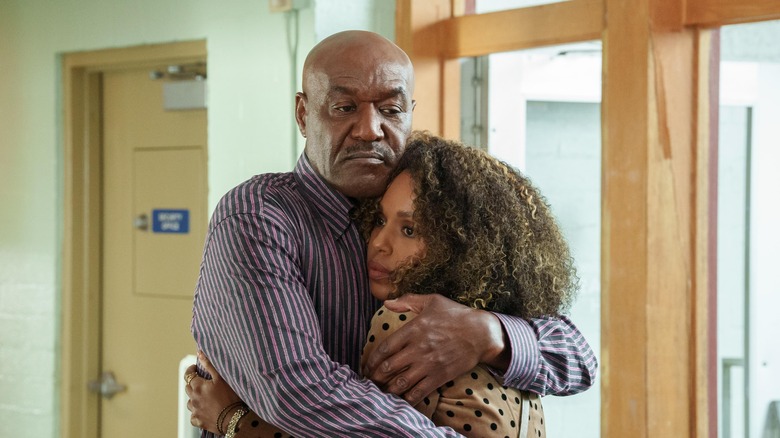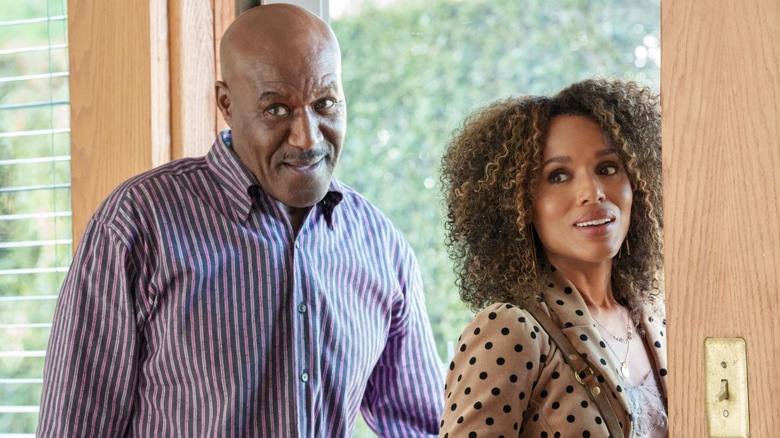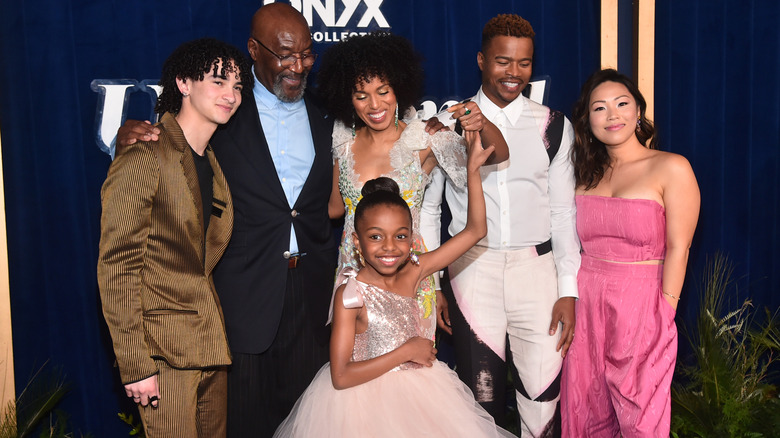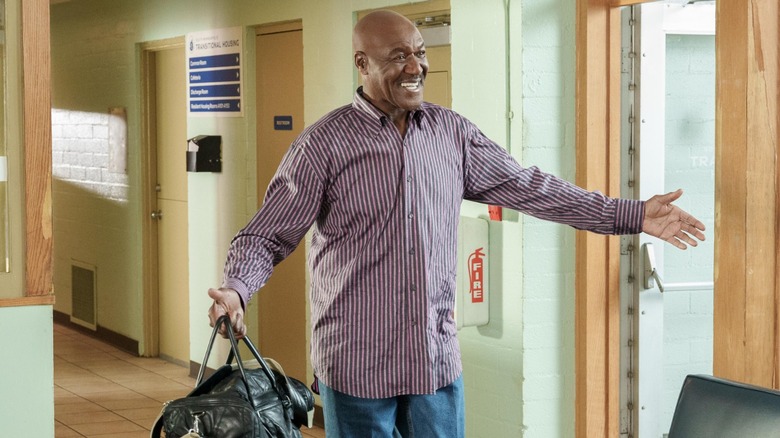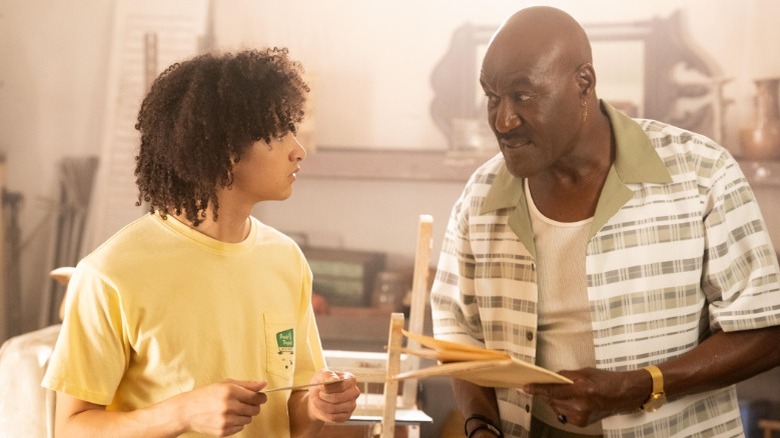Delroy Lindo Shares The Deeper Meaning Behind His New Hulu Series, UnPrisoned - Exclusive Interview
You may know Delroy Lindo as Paul from Spike Lee's "Da 5 Bloods" and Kerry Washington as Olivia Pope on "Scandal." Now, the pair is co-starring in Hulu's upcoming comedy "UnPrisoned," a moving family story based on creator Tracy McMillan's real life. Lindo plays Edwin, who has been incarcerated for 17 years. Upon his release, he seeks support from his daughter Paige (Washington), a social media-savvy therapist and single mom. But on his journey moving forward, his daughter — along with her inner child — struggle to accept his amends for the past.
There has been a 500% increase in mass incarceration in the last 50 years, according to the ACLU, and the current total prison population is approaching two million. One in five prisoners is incarcerated for drug charges, and 113 million adults living in the US have an immediate family member who has been in prison or jail. "UnPrisoned" deftly explores the realities of incarceration and life upon release, focusing on the difficulties formerly incarcerated folks face when applying for jobs and re-establishing themselves in their communities and family units.
Delroy Lindo is passionate about the stories he tells, and he's dedicated to representing greater truths through art. In his exclusive interview with Looper, Lindo shared how he connected with the story and collaborators of "UnPrisoned."
There were strong collaborators behind the scenes
You and Kerry Washington are both executive producers on "UnPrisoned," which is awesome. How did you guys first become attached to the project?
The simple answer's that Kerry [Washington] and Tracy [McMillan] brought me in, inclusive of my executive producer position on this project. They were very generous with me, and based on the content and the nature of our conversations, as we started to talk about the work and what the work could be and the things that we all wanted to focus on, we recognized that the basis of our communication was over and above me being an actor on this and that my involvement was additive to the overall journey and evolution of the piece. One doesn't always get that kind of response. The fact that they were as generous and as open as they were with me led to my becoming an executive producer.
That's wonderful. How did you and Kerry end up building that on-screen relationship?
We did our jobs. It sounds like a very mundane answer, but we did our jobs. Based on the conversations, the nature of the communication going into the project, the writing, the fact that Tracy is so intricately connected to this material, the way that the writing manifested in the writers' room, the people who put those scripts together — [all of that] resulted in a project that we all were pretty much on the same page [on] in terms of the direction we wanted the work to go in.
[That's] not to say that there weren't bumps along the road. There were, but any creative process will contain bumps and things that one has to negotiate. Broadly speaking, we were all on the same train, attempting to make this locomotive, to keep that metaphor going, make sure it was going in the same direction. And that was a beautiful thing. I say that in [the] context of the fact that [I have] worked on other projects in which those elements weren't quite present. They were and they are present in "UnPrisoned."
He made the character his own
What has it been like portraying Tracy McMillan's real-life story, or a version of that, and what kind of conversations did you have around playing her dad?
Ironically, one of the first conversations was "I'm not playing your dad." This character is inspired by Tracy's dad, but one of the first conversations that I had with Tracy and we continued to have throughout the course of making the work was revisiting and reconnecting with the fact "I'm not playing your dad."
While [her] dad is absolutely an inspiration for Edwin, and I gleaned a lot from speaking with Tracy's dad, in the final analysis, there was an agreement from all of us that that would be the point of departure and I would take those elements and create my own human being from that. We all were in agreement that that would be the way to go, and Tracy was very generous in terms of her willingness to let go of certain aspects of what she may think, what she may want, compared to the direction that I was actually going in with the character.
My next question is about the backdrop for the show "UnPrisoned." It takes place in Minneapolis, and the 1st episode touches on having a Black Lives Matter sign in your yard versus more tangible efforts in the racial justice movement. How do you feel like the backdrop informs the rest of the story or Edwin's story?
That's a great question, and I hope I can answer it and give the question some justice. The fact that this is happening at this particular point in time in this country gives it an added element of importance as far as I'm concerned. When you think about Black Lives Matter, for instance, what is the basis of the violation that African-descended people, people of color suffer? The basis of the violation is an ignoring of our humanity. That's what leads pretty much right across the board to the violation that we are subjected to. One of the things that "Unprisoned" is presenting are human beings who happen to be of-color human beings. There is a connection there that I hope will increase the importance.
I understand this is a TV show. It is, in the final analysis, entertainment, and I understand that. But one hopes that within the context of it being entertainment, it is a piece of entertainment that informs its audience of some things. What I want to believe, and one of the things that I am claiming as a participant in this process, is that we are reaffirming in the way that we are presenting these people ... We are presenting their humanity, all of their messiness, all of the missteps they make, the mistakes they make, all of that, which is, in the final analysis, human.
The shows reaffirms its characters' humanity
The show can do [all] that because it is art, and that's the most exciting part about it: It can be a comedy and a romance and deal with really serious issues.
It's very deft in that regard. They sent it to me when it was first cut together, and I haven't seen it in a while, but based on how people have been responding, it seems to be resonating [with] people in the ways that we wanted it to resonate. I feel really good about that.
Your character is looking for work after being incarcerated, but there are so many workplaces that have exclusionary hiring practices. As an actor, what was it like encountering so many real-life obstacles that people face when they have a criminal record?
I don't have a criminal record, but I've certainly had my share of doors slammed in my face as an actor, if I'm understanding your question accurately. But one of the first things that one has to learn as an actor is to grapple with the amount of rejection that comes with the territory.
Now, [regarding] playing a formerly incarcerated person and understanding that so many doors get slammed in the face, so many people [in] situations are fundamentally unwilling to give formerly incarcerated folk an opportunity, a chance. And even though you didn't ask me this question, I will say that one of my aspirations for this work is that it shifts that a little bit. I've never been incarcerated per se, but I certainly have quite a bit of experience with being enclosed either within myself or by others' perceptions of me.
In the final analysis, we're all trying to do the same thing, which is to live our lives with dignity, which formerly incarcerated people are trying to do. [It's] appropriate [for us] to be given the benefit of the doubt. Where would we be? Where would I be if, in some instances, I wasn't given the benefit of the doubt? Where would we all be? It comes down to ... This sounds so utopian, but it comes down to, how can we all be human together? And as a person of color, how do I cut through somebody else's propensity to misunderstand me based on how I look? How do we grapple with that?
The only way to grapple with that, negotiate that, is [to], as much as we can, affirm our humanity [and] be a human being. I don't want to use the term "message" because that sounds really heavy and didactic, but it does come down to who we all are as humans and how we inform the human condition. I want to believe that this work, even though it's entertainment, is going a small way to informing the human condition.
He hopes audiences learn something
I think [about] the contrast between freedom and normalcy. "Can you be free and try to be normal?" is [a] really interesting [question] in the show as well.
That's huge. That's a biggie.
You can sneak in these big ideas through the comedy aspect of it. Along with the larger themes, it's a drama, it's a romance, it's a comedy. What can fans expect from these first eight episodes? Are there any surprises in store that you can tease a little bit?
I hope there are surprises. I don't have any expectations of the audience. People come to the work through the lens of their own experiences, and that's a very elementary and obvious thing to say, but they do. They come to it through the lens of their own experiences.
However audiences can embrace this story, embrace these human beings, and relate to the pain and the fun and the love that these human beings are negotiating and exhibiting, I hope that it is sufficiently compelling that people embrace [and], in some instances, see themselves in the situations and it changes some opinions they may have about who and what they think of when they think about a formerly incarcerated person.
This interview has been edited for clarity.
All episodes of "UnPrisoned" will be released exclusively on Hulu on March 10.
